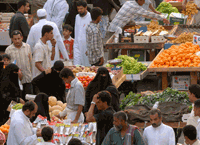
Saudi inflation at 4-year low, Qatar's at 1.9pc
Jeddah, January 14, 2012
Saudi Arabia's inflation slowed to a four-year low of 5 per cent on average last year despite record government spending, while living costs in Qatar rose 1.9 per cent after two years of deflation, data showed on Saturday.
Average consumer price growth in the $577 billion Saudi economy decelerated from 5.3 per cent in 2010 partly due to a drop in global food prices.
The 2011 figure is below the central bank's forecast of 5.8 per cent, published in its annual report, and above the finance ministry's December estimate of 4.7 per cent. It is in line with a December Reuters poll of analysts.
Inflation in the world's top oil exporter edged up to 5.3 per cent on an annual basis in December, which was also seen in September and January and was the highest level reached 2011, the data from the Central Department of Statistics and Information showed.
Month-on-month, price growth in the kingdom, which pegs its riyal currency to dollar, was 0.2 per cent, after increasing at the same pace in November, the data showed.
'It is pretty much flat as expected,' said Jarmo Kotilaine, chief economist at National Commercial Bank in Jeddah.
'We are looking at more of the same (in 2012). We tend to see some increased pressure from government spending but some relief from the relative strength of the dollar,' he said.
Last year, the government spent SR804 billion ($214 billion), the highest level ever, partly in response as social unrest rocked the Middle East. It has announced a SR690 billion budget for this year.
Saudi Arabia has seen limited protests by a Shi'ite minority in its oil-producing Eastern Province.
In December, food costs, which amount to 26 per cent of Saudi consumer expenses, dipped by 0.1 percent month-on-month, which was their first decline in seven months.
Prices of housing, one of the main inflation drivers, and related energy rose 0.5 percent in December for the second month in a row, the data showed.
Qatar forecasts
Prices in Qatar, the world's No.1 liquefied natural gas exporter, picked up again in 2011 after 2.4 per cent deflation in the previous year, a separate release from the Qatar Statistics Authority showed.
The 2011 average of 1.9 percent is below a forecast of 2.3 percent in a Reuters survey. Qatar's central bank governor said in October he expected inflation of 2.5 percent last year.
The Gulf state, spared the popular unrest that hit other parts of the Arab world last year, returned to annual inflation in December 2010.
The Opec member, which plans to boost infrastructure spending ahead pf the 2022 Soccer World Cup, announced in September 2011 a plan to raise basic wages and social benefits for state civilian employees by 60 per cent.
In December, consumer price inflation remained at 2.1 per cent on an annual basis and at 0.1 per cent month-on-month for the second consecutive month, the data showed.
Analysts polled by Reuters in December predicted Qatar would see average inflation of 3.5 per cent this year fuelled by higher credit growth and government spending.
Food prices in Qatar jumped by one per cent month-on-month in December. Rents and utility costs were flat, while transport and communications prices fell by 0.2 per cent, the data showed.-Reuters







